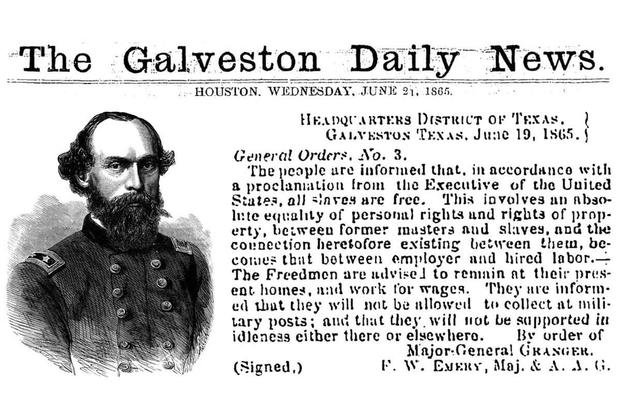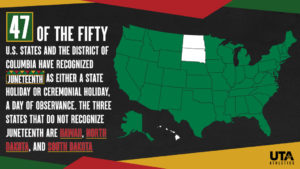|
Getting your Trinity Audio player ready...
|
Reading Time 5 mins
Originally published June 19, 2021

Also known as Liberation Day, Freedom Day, Jubilee Day, “Juneteenth”[1] is the oldest nationally celebrated commemoration of the ending of slavery in the United States. The celebration marks the events of June 19 (“Juneteenth”), 1865, when Union General Gordon Granger read the Emancipation Proclamation in Galveston, Texas (General Order #3), effectively freeing over a quarter million enslaved Blacks in the state. The problem was that the Proclamation was two and a half years old by then. (While there are varying theories explaining the deferment of freedom, it is believed that this delay was for the purpose of the enslavers prolonging the exploitation of enslaved Texans). However, when the news of emancipation eventually spread, it sparked a variety of celebrations in Texas’ African American communities. The day continued to be recognized and celebrations continued throughout the nation.
Texas was the first state to officially make Juneteenth a state holiday in 1980, although it had been celebrated informally on June 19, 1865, in Galveston, Texas, to mark the end of the Civil War and slavery in Texas. Today, Juneteenth is observed in all but four states across the United States.
On Thursday, June 17, 2021, US president Joesph Biden signed the Juneteenth National Independence Day Act making Juneteenth a federal holiday. The Act legally mandates a day that would commemorate the ending of slavery in the United States. The national recognition and celebration of Juneteenth is a victory for generations of African Americans across the country who have been advancing this struggle.
While in the Caribbean various dates in August are recognized as Emancipation Day (in tribute to the abolition of Caribbean slavery), in the United States June 19 is another emancipation day, Juneteenth.
Just as Juneteenth is a delayed recognition, emerged through decades of agitation, many Atlantic historians are advancing that August 23, 1791, (the beginning of the Haitian Revolution) also be recognized globally for its historical weight. Designated by the United Nations as International Day for the Remembrance of the Slave Trade and its Abolition, August 23 marks the launch of the uprising that ultimately led to the abolition of slavery in Saint Domingue and later to the creation of the Republic of Haiti, shaking the foundation of slavery throughout the Americas.
In recognition of the continuity of struggles and our shared legacy, many across the African Diaspora (including the Caribbean) salute these turning points — Juneteenth and the Caribbean’s August turning points — as common historical conjunctions, emancipation days.
Like the period leading up to Juneteenth, the apprentice system[2] in the British-colonized Caribbean delayed full emancipation in much of the region until 1838.
Similarly, leading up to emancipation, enslaved peoples did not wait for their freedom. It was the agency of enslaved African fleeing the plantations, and wanting to join the northern army that had precipitated a crisis for President Lincoln’s troops in the fields of battle. As the Union troops were advancing south, they were running into contraband camps of enslaved who had abandoned the plantations. These formerly enslaved were requesting rifles, offering themselves as fortification, and seeking manumission for their families, based on the promise of freedom.
The confederate enslavers were however determined to defend the system of slavery, demanding their ‘property’. In this pursuit, many slaveholders fled to Texas to maintain slavery beyond the Emancipation Proclamation. So, knowledge of their emancipation was withheld from the enslaved for the purpose of prolonging slavery in the state of Texas, especially in the western section of the state.
Juneteenth was first commemorated by political rallies to teach former enslaved African Americans about voting rights and other civic engagements new to them. Voters’ rights consciousness and the lessons of the African American experience are of critical importance today as Congress debates passing sweeping legislation that would protect the rights of voters of color, as well as new Civil Rights agendas such as passing the George Floyd Justice in Policing Act, which can bolster police accountability.
Juneteenth is also recognized to be about rejoicing, struggle, and voter activism, and can also be appreciated in that context. Juneteenth also commemorates African American freedom and emphasizes education and achievement.
The length of the Juneteenth festivities varies. In some cases, it is a day, in others a week, and in some areas a month is marked with celebrations, guest speakers, picnics, and family gatherings.

However, the prolonging of slavery and the postponement of freedom in Texas is not the only deferment to contemplate on Juneteenth. On June 13, 2005, the U.S. Senate passed a resolution officially expressing remorse for its unwillingness for decades to outlaw the lynching of African Americans and others. This collusion with what Sen. Mary Landrieu called “an American form of terrorism” was responsible for the deaths of over 4,700 people (these included 3,440 black women and men) between 1882, when records were first kept, and 1968, when the practice diminished. According to congressional records, nearly 200 anti-lynching bills were introduced in Congress during the first half of the 20th century, between 1890 and 1952, 7 presidents petitioned Congress to end lynching.
There were several attempts to outlaw lynching over the decades. One of the devices used to prevent the passage of such legislation was the filibuster. It is an ironic twist of history that judicial nominees with an agenda to roll back the civil rights agenda, received virtually no opposition to their nomination because of the absence of the filibuster through a bipartisan “compromise” on the matter.
Lynching was a terror tactic used to intimidate African Americans into social and political submission in the post-slavery/post-Reconstruction era. Often witnessed by huge masses in local communities as a spectacle or entertainment, many Blacks were lynched for outspokenness or other presumed offenses against whites or in the aftermath of “race riots.” In many instances, the practice involved the cooperation of law enforcement.
As the reparations movements in the United States and the Caribbean advance, with H.R. 40 Bill in the US Congress and the CARICOM Ten Point Plan for Reparatory Justice respectively, the deferment of emancipation in Texas, lynchings, and instances of sadistic police brutality – the recent George Floyd murder being one of the more visible – should be recognized as particular cases requiring specific compensation to the families of these victims of systematic exploitation and terror.
Juneteenth can provide the basis for national teach-ins, sensitizing the nation to our shared destiny as well as to the conditions and experiences of others. The increasing institutionalization of Juneteenth signifies a certain maturity of the US civil rights movement. As reflected in the 46 states and the District of Columbia that are currently celebrating Juneteenth as a public holiday, it is becoming an event embraced by people of all races, nationalities, and religions, acknowledging a moment in American history that shaped and continues to influence the social fabric of the United States.
Big Drum Nation joins in the celebration on June 19th—Juneteenth — and encourages our readers to share the attached New York City Department of Education resources widely, but especially to friends and family.
Happy Juneteenth!
[1] “Juneteenth” is a portmanteau of “June” and “19th”.
[2] Great Britain had started the apprentice system in 1833 as a halfway policy, in which slaves first became apprentices before they could gain their freedom.

Martin P. Felix is co-editor of Big Drum Nation. A visual artist and educator, he lives with his family in New York City.
TAGS: #blackhistory #blacklivesmatter #juneteenth #juneteenth2020 #juneteenthcelebration #blacklivesmatter #repararations

